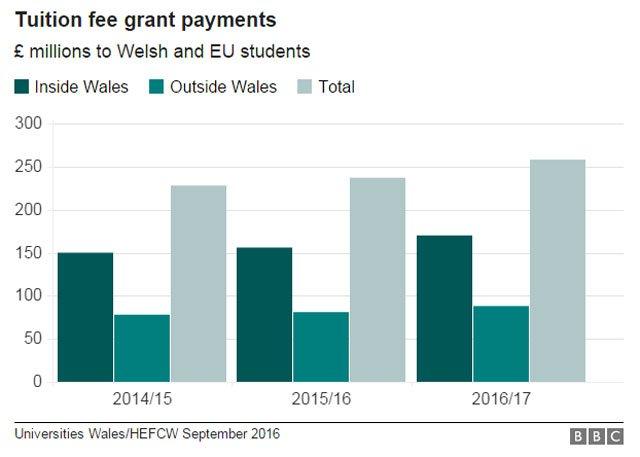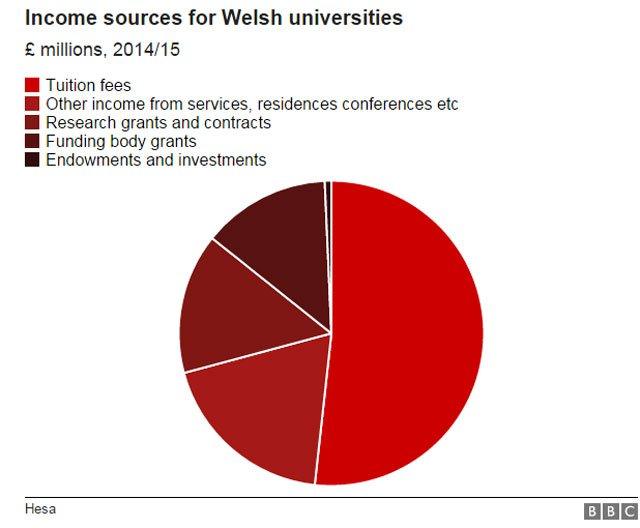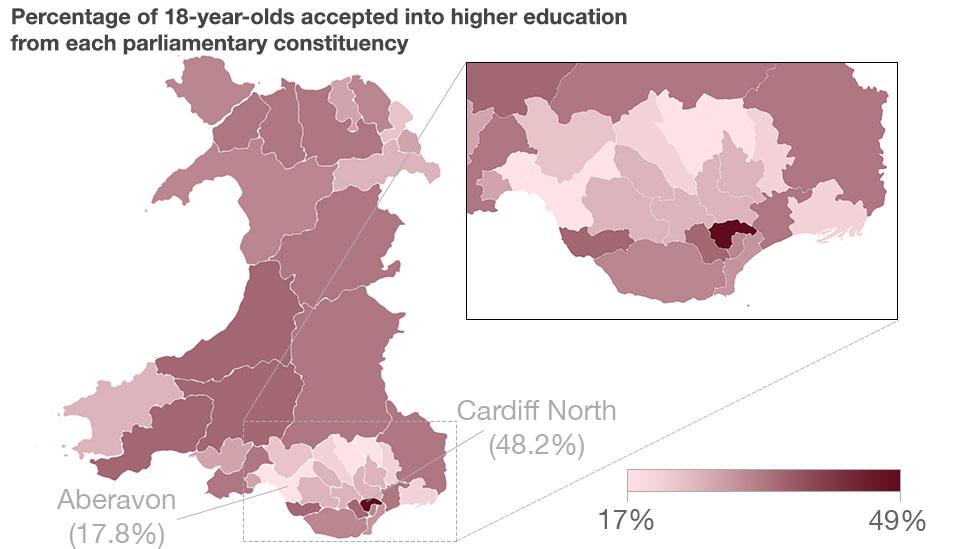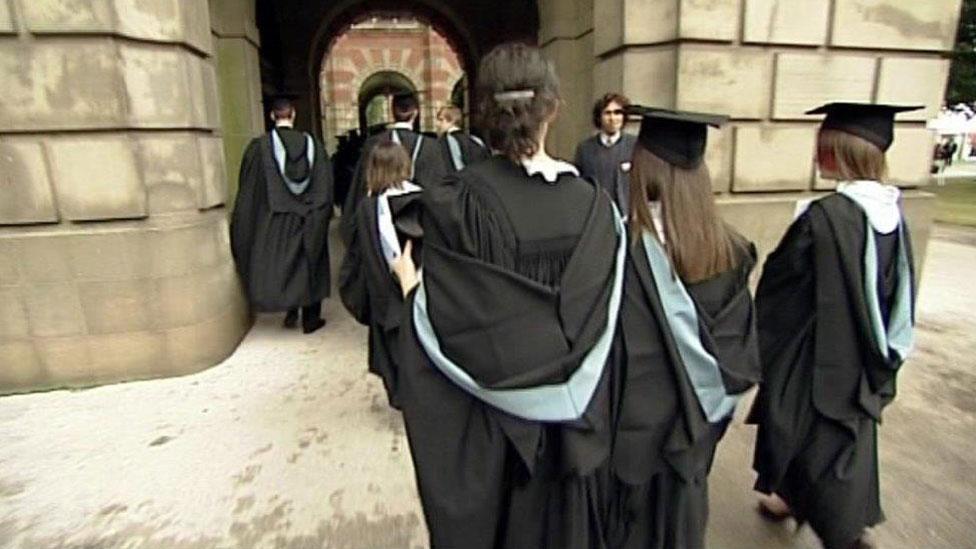Money matters for universities as tuition fees review out
- Published

Soon after the Welsh Government started paying out grants towards Welsh students' university fees, vice chancellors raised concerns.
The funding for Welsh higher education was being top-sliced to pay for the grant.
Many of those grant payments were eventually ending up in Welsh universities' coffers anyway, via Welsh students studying here.
But their main concern was the cash going over the border to pay fees at English universities.
The latest figures indicate that the Welsh Government contributes nearly £90m to fees at universities in other parts of the UK.
From the universities' perspective that is money lost to Welsh higher education.

MONEY LEAVING WALES
From September 2012, the money has followed the student. To cushion Welsh students from rises in fees at colleges across the country, the Welsh Government agreed to give every student a grant of £5,100 to help them - wherever they chose to study.
But to the universities here, it has meant a brain drain and money crossing the border - nearly £90m is estimated for this new academic year to be leaving Wales with the student.
University of West of England in Bristol received the most outside Wales - worth £6.7m in tuition fee grants in 2014-15.
The education secretary has said recently she still wants student support to be "portable for Welsh students anywhere in the UK".


The government argues that universities' income overall has increased - boosted by a significant number of English students and their fees at Welsh universities.
There is still a net inflow of students coming into Wales - it meant at the start of September, 2,410 more students had chosen to study in Wales from England than those from Wales who travelled in the other direction.
This boosts the coffers of Welsh universities. In total for 2014-15 the Welsh higher education sector had an income of £1.43bn.
More than half of this came from tuition fees and education contracts.
Research income brought another 15%.
The Welsh Government has given the Higher Education Funding Council for Wales (HEFCW) nearly £132.5m to fund universities for this year.
From this, £21.1m might need to be re-allocated if the tuition fee grant demands are bigger than expected.
Which leaves about £112m from HEFCW to fund universities for the core of their work.
So where is the money going? We know of the £1.38bn spent in 2014-15, about 58% went on academic and other staff costs.
Welsh universities have said the tuition fee grants - set to cost £258m in 2016/17 - could be better spent helping poor students.
Prof Gareth Rees, of the Wales Institute of Social and Economic Research, Data & Methods (Wiserd) said the cost of higher education would increase over time - with fees in England likely to follow suit.
"If it's the case that the amount of money coming in from English students coming to Welsh universities remains sufficiently large that the subsidy - what would be an increasing subsidy to a Welsh student - offsets it then it may well be that the policy would be sustainable," he said.
"My personal view is that the policy of the Welsh Government is not sustainable in the longer term and those inflationary pressures would be one aspect, but obviously there are other aspects too that I think make it a very difficult policy to sustain."

Widening access
Education Secretary Kirsty Williams also wants to make sure students from poorer backgrounds are not put off going to university.
"We want to make sure that those who wish to go on to university are able to," she said on Tuesday.
For students from families with household incomes of less than £20,000 a year, it should mean under the proposals they would qualify for the maximum grant of more than £9,000 - an equivalent of earning the National Living Wage.
Fewer pupils from poorer parts of Wales get to university.
Entry rates are broken down across the UK into constituencies and analysis shows they are lower in more disadvantaged areas.
In Wales, the entry rate range is from just under 18% of 18-year-olds in Aberavon, to just over 48% in Cardiff North.
The organisation representing universities has called for a means-tested grant up to post-graduate level as the way forward, with tuition fee grants targeted to help those that need them most.
Prof Colin Riordan, chairman of Universities Wales, said it was "fair to students and their families," giving the help with living costs now.
He said it would also provide support for part-time and post-graduate students.
At times, the Welsh Government has been impatient with academics' complaints about funding.
Earlier this month, Ms Williams suggested that universities should not focus as much on financial issues and should be more active in their communities and in driving forward national economic and social priorities.
Some of her predecessors were more blunt in expressing their view of the return Wales gets for millions invested in its higher education institutions.
But since the Diamond review started its work in 2014, politicians and university bosses, some of whom have been on the Diamond panel, have looked to the report for answers.
Prof Riordan said it would take time for the recommendations to be brought in but despite financial challenges, universities would find ways to manage in the mean time.
"If the recommendations are implemented, then I feel it will be sustainable future for universities," he added.
- Published27 September 2016

- Published27 September 2016

- Published27 September 2016

- Published15 August 2018

- Published29 November 2015

- Published16 February 2015

- Published19 April 2016

- Published18 December 2015

- Published30 November 2010